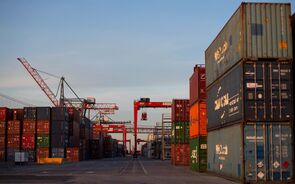Schroeder perde as eleições na Alemanha, em grande
1 Mensagem
|Página 1 de 1
Schroeder perde as eleições na Alemanha, em grande
Vai ser uma semana interessante, lá isso vai.
http://www.iht.com/articles/85349.html
Coordinated stand with Paris loses legitimacy
PARIS After the masquerade, the debacle: Chancellor Gerhard Schroeder’s massive provincial election defeat on Sunday now may well tear apart German-French resistance on Iraq, coming on the heels of eight European Union partners’ making clear they would not accept France and Germany as a self-imposed leadership tandem for Europe.
The real message from the rebellious eight last week — not the excruciating reality of Europe’s being divided and the EU’s having no common foreign and security policy — was the group’s success in exposing as a near-empty shell a German-French effort to turn European governments against the United States on a war-and-peace issue.
Instead, in an EU expanding eastward to an increasingly pro-American membership of 25, there is incontrovertible evidence that neither the numbers nor instincts are there for a Europe ready to clasp a wavering, tentative French-German pair as its guide on the world stage, and toss out America as de facto leader and guarantor of its survival.
Now, with Schroeder’s humiliating defeat, described as a debacle a week before the event by Der Spiegel magazine, the tandem has dramatically lost legitimacy. Four months after re-electing a chancellor candidate who rejected standing with the United States on Iraq, voters in his own home state chose censure of his Social Democratic party as a more urgent gesture than embracing Schroeder’s stop-the-war alliance with France.
Short of resignation, Schroeder has nowhere comfortable left to maneuver. But the French, who hoped to be playing the pacifist card with Germany to challenge the Americans, still have the option of going along with the United States at the United Nations UN Security Council and in an eventual strike against Iraq.
When President Jacques Chirac meets Tuesday with Prime Minister Tony Blair he will have the chance to tilt France back toward the majority that will dominate the EU for years to come. With Blair gently holding the door open, it would no longer matter that on Jan. 14, although France never excluded military action, Chirac called the French and German view on blocking an Iraq war ‘‘identical, essentially the same.’’
Over the weekend, and before Schroeder’s defeat, clear statements were at hand demonstrating both a specific lack of taste for a French-German condominium to run the EU, and the expectation that the French would be on the American side soon.
Former Chancellor Helmut Kohl pointed to exactly such a flip. He said in an interview Sunday, ‘‘I expect it.’’
Wolfgang SchaeubleSchaeubele, the most widely respected active Christian Democratic leader, made the same point.
Other Europeans clearly shot at what they suggested were the pretensions of the French and the Germans. Antonio Martins da Cruz, foreign minister of Portugal, one of the eight countries aligning with the United States last week, said France and Germany were going to have to get used in a 25-member EU to ‘‘geometrical variations’’ outside their own axis.
For General Klaus Naumann, the retired German commander of NATO’s military committee during the Kosovo intervention, the eight’s declaration was ‘‘a reaction against Paris and Berlin’s trying to pin the others to their own predecided positions.’’
This attempt, he suggested, resulted in the ‘‘worst blow ever suffered by the common foreign and security policy in Europe.’’
‘‘Frankly,’’ said a high European Union official in Brussels, ‘‘people are getting fed up with this French-German axis. They outbid their possibilities. There are more empty gestures than willingness to work on the bread-and-butter issues.’’
Even voices from France’s own community of security analysts, normally not inclined to challenge French policy on its most basic levels, were raised to say that the French-German initiative was botched and opposed to France’s deepest interests.
Rather than preparing French public opinion by explaining the stakes in Iraq, said Dominique Moisi, deputy director of the French Institute of International Relations, there had been ‘‘demagoguery’’ in France. ‘‘On one side, there’s talk like Germany’s. On the other, there are [military] preparations like Britain’s, although to a lesser degree.’’
At another level, a question was raised about what France had really gotten itself into with Germany. No doubt, it had offered the Schroeder government a boost out of the isolation of its stand-alone position, coupled with the goal of building a French-German front to move the rest of Europe in its direction.
But in the view of much of Europe, this was a contradictory, hardly confidence-generating partnership. It didn’t add up on the details on Iraq, or on the deepest historical evidence of Europe after the Berlin Wall.
After all, as much as France under Francois Mitterrand had tried to block German reunification, Schroeder’s Germany had sought in December 2000 to gain greater voting rights for Germany than France in the EU, what Chirac called the attempted ‘‘unhooking’’ of the two countries’ semblance of parity.
Now, while France’s intervention troops were poised in Ivory Coast to engineer the historic evacuation of 16,000 French citizens from its African showplace, Germany’s pacifist instincts appeared to point radically away from the French desire to remain a global, unmistakably military player.
Traditionally, France has dreaded the notion of a pacifist, neutralized Germany, suffused with a renewed, righteous nationalism. German slippage in that direction appeared so marked that Foreign Minister Joschka Fischer stepped in last week with a seeming at tempt to call the situation to order. He warned against ‘‘primitive anti-Americanism,’’ and said that the United States was irreplaceable as a factor in the security in the world.
It may have been intended as irony, but in a column appearing just before the eight-nation statement, Hans-Ulrich Joerges, of Stern magazine, one of Germany’s most acute political writers, laid out what he said could be the ‘‘victory scenario’’ for Schroeder’s Germany: ‘‘The most important Allies, Tony Blair included, spurn the United States because their people would otherwise turn their backs on them. The conflict becomes the birthing hour of European Unity. NATO and the United Nations are democratized. The Old Continent becomes a world power.’’
German brushes with political wit apart, leaders who have asked Foreign Minister Dominique de Villepin in the last few days to define the differences between the German and French positions in this context have gotten unequivocal answers.
A high Allied official said he was told, with what he described as alacrity, that the French position was absolutely not that of Germany. The high official was informed that France would behave responsibly in the Security Council.
With their diplomatic capacity to create the satisfactorily ambiguous, that French choice of responsibility on Iraq seemed to the high official to be one that would bring France along, more firmly than Russia or China, to the side of the United States. For the French that meant, with the French-German masquerade at an end, finding a formula sooner rather than later to slough off Schroeder’s losing team.
http://www.iht.com/articles/85349.html
Coordinated stand with Paris loses legitimacy
PARIS After the masquerade, the debacle: Chancellor Gerhard Schroeder’s massive provincial election defeat on Sunday now may well tear apart German-French resistance on Iraq, coming on the heels of eight European Union partners’ making clear they would not accept France and Germany as a self-imposed leadership tandem for Europe.
The real message from the rebellious eight last week — not the excruciating reality of Europe’s being divided and the EU’s having no common foreign and security policy — was the group’s success in exposing as a near-empty shell a German-French effort to turn European governments against the United States on a war-and-peace issue.
Instead, in an EU expanding eastward to an increasingly pro-American membership of 25, there is incontrovertible evidence that neither the numbers nor instincts are there for a Europe ready to clasp a wavering, tentative French-German pair as its guide on the world stage, and toss out America as de facto leader and guarantor of its survival.
Now, with Schroeder’s humiliating defeat, described as a debacle a week before the event by Der Spiegel magazine, the tandem has dramatically lost legitimacy. Four months after re-electing a chancellor candidate who rejected standing with the United States on Iraq, voters in his own home state chose censure of his Social Democratic party as a more urgent gesture than embracing Schroeder’s stop-the-war alliance with France.
Short of resignation, Schroeder has nowhere comfortable left to maneuver. But the French, who hoped to be playing the pacifist card with Germany to challenge the Americans, still have the option of going along with the United States at the United Nations UN Security Council and in an eventual strike against Iraq.
When President Jacques Chirac meets Tuesday with Prime Minister Tony Blair he will have the chance to tilt France back toward the majority that will dominate the EU for years to come. With Blair gently holding the door open, it would no longer matter that on Jan. 14, although France never excluded military action, Chirac called the French and German view on blocking an Iraq war ‘‘identical, essentially the same.’’
Over the weekend, and before Schroeder’s defeat, clear statements were at hand demonstrating both a specific lack of taste for a French-German condominium to run the EU, and the expectation that the French would be on the American side soon.
Former Chancellor Helmut Kohl pointed to exactly such a flip. He said in an interview Sunday, ‘‘I expect it.’’
Wolfgang SchaeubleSchaeubele, the most widely respected active Christian Democratic leader, made the same point.
Other Europeans clearly shot at what they suggested were the pretensions of the French and the Germans. Antonio Martins da Cruz, foreign minister of Portugal, one of the eight countries aligning with the United States last week, said France and Germany were going to have to get used in a 25-member EU to ‘‘geometrical variations’’ outside their own axis.
For General Klaus Naumann, the retired German commander of NATO’s military committee during the Kosovo intervention, the eight’s declaration was ‘‘a reaction against Paris and Berlin’s trying to pin the others to their own predecided positions.’’
This attempt, he suggested, resulted in the ‘‘worst blow ever suffered by the common foreign and security policy in Europe.’’
‘‘Frankly,’’ said a high European Union official in Brussels, ‘‘people are getting fed up with this French-German axis. They outbid their possibilities. There are more empty gestures than willingness to work on the bread-and-butter issues.’’
Even voices from France’s own community of security analysts, normally not inclined to challenge French policy on its most basic levels, were raised to say that the French-German initiative was botched and opposed to France’s deepest interests.
Rather than preparing French public opinion by explaining the stakes in Iraq, said Dominique Moisi, deputy director of the French Institute of International Relations, there had been ‘‘demagoguery’’ in France. ‘‘On one side, there’s talk like Germany’s. On the other, there are [military] preparations like Britain’s, although to a lesser degree.’’
At another level, a question was raised about what France had really gotten itself into with Germany. No doubt, it had offered the Schroeder government a boost out of the isolation of its stand-alone position, coupled with the goal of building a French-German front to move the rest of Europe in its direction.
But in the view of much of Europe, this was a contradictory, hardly confidence-generating partnership. It didn’t add up on the details on Iraq, or on the deepest historical evidence of Europe after the Berlin Wall.
After all, as much as France under Francois Mitterrand had tried to block German reunification, Schroeder’s Germany had sought in December 2000 to gain greater voting rights for Germany than France in the EU, what Chirac called the attempted ‘‘unhooking’’ of the two countries’ semblance of parity.
Now, while France’s intervention troops were poised in Ivory Coast to engineer the historic evacuation of 16,000 French citizens from its African showplace, Germany’s pacifist instincts appeared to point radically away from the French desire to remain a global, unmistakably military player.
Traditionally, France has dreaded the notion of a pacifist, neutralized Germany, suffused with a renewed, righteous nationalism. German slippage in that direction appeared so marked that Foreign Minister Joschka Fischer stepped in last week with a seeming at tempt to call the situation to order. He warned against ‘‘primitive anti-Americanism,’’ and said that the United States was irreplaceable as a factor in the security in the world.
It may have been intended as irony, but in a column appearing just before the eight-nation statement, Hans-Ulrich Joerges, of Stern magazine, one of Germany’s most acute political writers, laid out what he said could be the ‘‘victory scenario’’ for Schroeder’s Germany: ‘‘The most important Allies, Tony Blair included, spurn the United States because their people would otherwise turn their backs on them. The conflict becomes the birthing hour of European Unity. NATO and the United Nations are democratized. The Old Continent becomes a world power.’’
German brushes with political wit apart, leaders who have asked Foreign Minister Dominique de Villepin in the last few days to define the differences between the German and French positions in this context have gotten unequivocal answers.
A high Allied official said he was told, with what he described as alacrity, that the French position was absolutely not that of Germany. The high official was informed that France would behave responsibly in the Security Council.
With their diplomatic capacity to create the satisfactorily ambiguous, that French choice of responsibility on Iraq seemed to the high official to be one that would bring France along, more firmly than Russia or China, to the side of the United States. For the French that meant, with the French-German masquerade at an end, finding a formula sooner rather than later to slough off Schroeder’s losing team.
1 Mensagem
|Página 1 de 1
Quem está ligado:
Utilizadores a ver este Fórum: AlfaTrader, Bing [Bot], hugob0ss, InvComValor, joao garcao, KAWA, latbal, m-m, malakas, Mavericks7, MR32, nunorpsilva, O Magriço, PAULOJOAO, SerCyc, Shift72, Simplório, trilhos2006 e 118 visitantes


